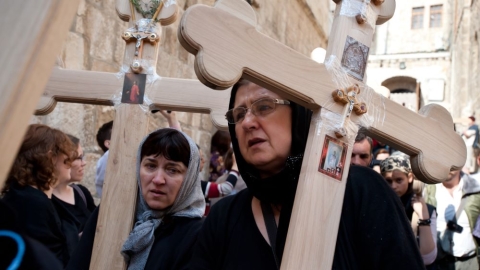Euthanasia in France: Standoff Between Caregivers and the Government

The draft law on euthanasia concocted by the government of Elisabeth Borne clashes with caregivers who see it as an “unacceptable solution” and denounce once again the “lack of consultation” of the executive which nevertheless intends to do everything possible to achieve one of candidate Emmanuel Macron's campaign promises in 2022.
The bill announced by the end of summer 2023 would, according to the Ministry of Health, go in three directions: active assistance in dying, palliative care, and support for “caregivers,” i.e., to those who formally cooperate in performing the act of assisted suicide.
For the government, it would be more oriented – one must use the conditional at present – towards a practice that would allow the patient to end his life himself, with minimum medical supervision, rather than “hard” euthanasia, where the lethal cocktail is administered by the caregivers themselves.
A purely semantic distinction in order to lull public opinion, because in fact, it is always a matter of seriously opposing the 5th commandment of God, which is an integral part of the natural law engraved in the heart of every man coming in this world: “Thou shalt not kill.”
But caregivers do not intend to be fooled. So, on June 20, around fifteen health organizations wrote to the Minister Delegate in charge of Territorial Organization and Health Professions to reiterate their refusal to implement active assistance in dying.
“It is up to us to legitimately define what is our professional responsibility. …We have the impression of not being listened to,” protests Ségolène Perruchio, director of the palliative care service at the Rives de Seine hospital center in Puteaux (Hauts-de-Seine).
For this health professional, who speaks on behalf of the French Society for Support and Palliative Care (SFAP), “we do not want caregivers who are explicitly opposed due to their conscience, to be required to render the death.”
On the executive’s side, relying on the same tactics used in pushing through the pension reform, it is a matter of giving the illusion of consultation: “The minister has recognized that the working group of caregivers was not asked for a ‘co-construction’ of the law, but simply consulted because of their medical expertise and their place in the front line of the process,” deplores Ségolène Perruchuio.
It is clear, for the practitioner, that “euthanasia or assisted suicide should not be part of the patient care pathway,” because “when a patient tells us: ‘I can't take it anymore’ our response must be to improve his care and seek new solutions rather than plan a date for euthanasia.”
But other dissonances have already been heard within the government. The Minister of Health himself had expressed reservations on the question very early on: “Accompanying death is not rendering death,” declared François Braun to Le Monde on April 8, 2023.
As far as the parliamentary process goes, the government's project has not met with enthusiasm since the groups Les Républicains (LR), socialist (SER), and communist (PC) have all declined to participate in view of a “co-construction” of the legislation: a political and opportunistic stance that is careful not to express any substantive opinion on the debate.
It remains to be seen how the executive will manage to deal with the ‘bronca’ of caregivers and parliamentarians. There is already talk of the possibility of sugar coating the bitter pill of assisted suicide with a ten-year plan devoted to palliative care.
At worst, the government will find a way to attach euthanasia to the finance law, to resort to Article 49.3 of the Constitution, which, in recent months, has seen that it could be consummated without moderation.
(Sources : Le Monde/Le Figaro – FSSPX.Actualités)
Illustration : Photo 180716873 © Iuri Gagarin | Dreamstime.com





